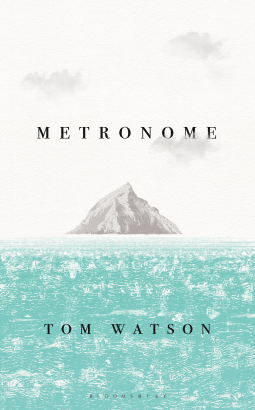Metronome by Tom Watson
For twelve years Aina and Whitney have been in exile on an island for a crime they committed together, tethered to a croft by pills they must take for survival every eight hours. They’ve kept busy – Aina with her garden, her jigsaw, her music; Whitney with his sculptures and maps – but something is not right.
Shipwrecks have begun washing up, and their supply drops have stopped. And on the day they’re meant to be collected for parole, the Warden does not come. Instead there’s a sheep. But sheep can’t swim…
As days pass, Aina begins to suspect that their prison is part of a peninsula, and that Whitney has been keeping secrets. And if he’s been keeping secrets, maybe she should too. Convinced they’ve been abandoned, she starts investigating ways she might escape. As she comes to grips with the decisions that haunt her past, she realises her biggest choice is yet to come.
Dystopian Fiction
With many of the worlds previous solid democracies now shifting to the right and falling under the control of oligarchs, it’s no wonder that Dystopian fiction is popular. ‘Metronome’ by Tom Watson falls into that category, with its bleak and eerie atmosphere. There’s also a strong sense that you never quite know what’s going on.
I’m a fan of Emily St. Mandel and her post pandemic world in ‘Station Eleven’ but there’s an optimism there, (‘Survival is insufficent’) but in this world it’s two people being trapped in tiny cottage somewhere in the wilds of Scotland - some of the themes are more in tune with McCarthy’s ‘The Road’ though maybe not as bleak as that (in fairness, not much is).
Something has happened in the industrialised world, but we’re never quite sure what it is. Aina and Whitney have been banished from their previous lives, for reasons I won’t go into, but are central to the plot. There was something grey and Orwellian about the place they left (impossible to write about Dystopian fiction without mentioning Orwell).
World
The voice we hear is Ainas, an increasingly secretive and paranoid one as she wonders about Whitneys intentions and begins to make plans herself, though it’s a difficult environment in which to make any without being discovered. This is not helped by the fact that you can’t stray far from the pill clock which delivers every eight hours - if you don’t get your tablet, the consequences are dire. (This reminded me of the hatch in ‘Lost’ where you had to keep entering the same numbers every couple of hours).
The ticking of the metronome, the pill clock, the odd refrain of ‘an, tan, tethera, methera, pip’ (no idea what it means, but theres a old world rhythm to it, maybe gaelic) - all adds to the claustrophobic atmosphere. Aina and Whitneys relationship becomes slightly frayed, as you’d imagine after spending twelve years huddled together in a crumbling croft with only a sheep and a desolate landscape for company.
There’s also a sense that they have been forgotten about by the outside world, with remnants of it washing up on the nearby shoreline. They’re waiting on a call to tell them their parole has finished. But is there anyone out there?
Summary
I enjoyed this well enough - like watching horror movies, there are times when I want to read about an imagined world worse than ours. There’s an uneasiness to the narrative that pulled me in, and there’s something intriguing about the set up. And for all its bleakness its an easy read, especially in the final third, when the kettle comes to the boil so to speak, and the pace quickens.
320 Pages, Hardback published March 31, 2022 by Bloomsbury Publishing


